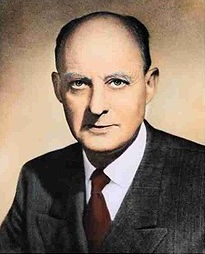 First as a pastor in Detroit and then as a seminary professor in New York, Reinhold Niebuhr (1892–1971) was an influential voice for Christian ethics in the twentieth century. The cross of Christ was a particularly important theme in his thought.1 In this passage from “The Christian Church in a Secular Age,” Niebuhr explains that brokenness and repentance at the foot of the cross are essential, that arrogance is deadly, while humility and godly sorrow are life-giving. This is true for civilizations as well as for individuals.
First as a pastor in Detroit and then as a seminary professor in New York, Reinhold Niebuhr (1892–1971) was an influential voice for Christian ethics in the twentieth century. The cross of Christ was a particularly important theme in his thought.1 In this passage from “The Christian Church in a Secular Age,” Niebuhr explains that brokenness and repentance at the foot of the cross are essential, that arrogance is deadly, while humility and godly sorrow are life-giving. This is true for civilizations as well as for individuals.
The question is, what shall the Christian Church say to this modern culture, which began its adventure in autonomy with such gay self-assurance, which is already so deeply involved in “riotous living” and which faces so certain a doom of a mighty famine?
We must, of course, preach the gospel to this, as to every generation. Our gospel is one which assures salvation in the Cross of Christ to those who heartily repent of their sins. It is a gospel of the Cross; and the Cross is a revelation of a love of God only to those who have first stood under it as a judgment. It is in the Cross that the exceeding sinfulness of human sin is revealed. It is in the Cross that we become conscious how, not only what is worst, but what is best in human culture and civilization is involved in man’s rebellion against God. It was Roman law, the pride of all pagan civilization, and Hebraic religion, the acme of religious devotion, which crucified the Lord. Thus does the Cross reveal the problem of all human culture and the dilemma of every human civilization.
Repentance is the first key into the door of the Kingdom of God. God resisteth the proud and giveth grace to the humble. Whenever men trust their own righteousness, their own achievements, whenever they interpret the meaning of life in terms of the truth in their own culture or find in their own capacities a sufficient steppingstone to the Holy and the Divine, they rest their life upon a frail reed which inevitably breaks and leaves their life meaningless.
Perhaps that is why the truest interpretations of the Christian faith have come in moments of history when civilizations were crumbling and the processes of history and the judgments of God had humbled human arrogance. The faith of the Hebrew prophets was thus formulated when the culture religion of Israel was threatened and finally overcome by the mighty civilizations of Assyria and Babylon. Augustine wrote the City of God when Roman civilization, once mighty enough to seem identical with civilization itself, had become the helpless victim of barbarians; the renewal of the Christian gospel in the Protestant Reformation was, historically speaking, the consequence as well as the cause of the crumbling of a once proud medieval civilization. Proud men and successful civilizations find it difficult to know God, because they are particularly tempted to make themselves God. That is why “not many mighty, not many noble, not many wise after the flesh are called.” Without the godly sorrow that worketh repentance there can be no salvation.2
————————————————-
Endnotes:
1 Mark Noll, “Reinhold Niebuhr,” Evangelical Dictionary of Theology, ed. Walter Elwell (Grand Rapids: Baker Academic, 2001), 842.
2 Reinhold Niebuhr, “The Christian Church in a Secular Age,” in Christianity and Power Politics (New York: C. Scribner’s Sons, 1940), 210-212.
